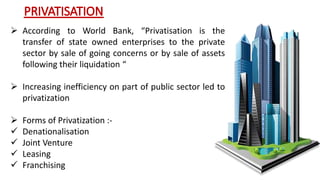The New Economic Policy 1991
- 1. PRESENTED BY :- ÔÉò CHITRAKSH KAPIL ÔÉò DEVASHISH MEHAR ÔÉò DIVYESH KUMAR ÔÉò HARSH MEHROTRA ÔÉò HARSHVARDHAN SAINI
- 2. WHAT IS NEW ECONOMIC POLICY ? ÔÉò It refers to ongoing economic liberalisation or relaxation started in 1991 of the countries economic policies ÔÉò It was introduced with the goal of making the economy more market-oriented and expanding the role of the private and foreign investment.
- 3. ÔÉò Specific changes include the reduction in import tariffs, deregulation of markets, reduction of taxes, and greater foreign investment. ÔÉò The liberalization has been credited by its proponents for the high economic growth recorded by the country in the 1990s and 2000s. ÔÉò On the other hand, its opponents have blamed it for increased poverty, inequality and economic degradation.
- 4. NEW ECONOMIC POLICY LIBERALISATION PRIVATISATION GLOBALISATION
- 5. LIBERALISATION ÔÉòThe first aspect of new economic policy was liberalisation ÔÉòLiberalisation of an economy means removing or relaxing government controls and restrictions on economic activities ÔÉòRelief for foreign invertors ÔÉòRevaluation of Indian Currency ÔÉòNew Industrial Policy ÔÉòNew Trade Policy ÔÉòImport Technology ÔÉòEncouraging foreign tie-ups ÔÉòPrivatisation in Public Sector
- 6. POSITIVE EFFECTS ÔÉò Increase in foreign investment ÔÉò Increase in Production ÔÉò Technological advancement ÔÉò Increase in GDP growth rate NEGATIVE EFFECTS ÔÉò Increase in Unemployment ÔÉò Decrease in Tax Receipt
- 7.  According to World Bank, “Privatisation is the transfer of state owned enterprises to the private sector by sale of going concerns or by sale of assets following their liquidation “  Increasing inefficiency on part of public sector led to privatization  Forms of Privatization :-  Denationalisation  Joint Venture  Leasing  Franchising
- 8. IMPACTS OF PRIVATISATION POSITIVE EFFECTS ÔÉò Private companies cut cost and be more efficient ÔÉò Increased competition ÔÉò More Responsive to customer complaints NEGATIVE EFFECTS ÔÉò Public service ÔÉò Job loss ÔÉò Privatisation is expensive
- 9. GLOBALISATION ÔÉòGlobalisation means reduction or removal of government restriction on the movement of goods and service, capital, technology and talent across national boundaries. ÔÉòIt is the increasing interdependence, integration and interaction among people and cooperation in various locations around the world.
- 10. IMPACTS OF GLOBALISATION POSITIVE EFFECTS ÔÉò Expansion of market ÔÉò Development of infrastructure ÔÉò Higher living standards ÔÉò International cooperation NEGATIVE EFFECTS ÔÉò Cut throat competitions ÔÉò Rise in Monopoly ÔÉò Take over of Domestic Firms ÔÉò Increase in Inequalities
- 11. Impact of NEP 1991 on Indian Economy a) Increasing Competition b) More Demanding Customers c) Rapidly Changing Technological Environment d) Necessity for Change e) Need for Developing Human Resources f) Market Orientation g) Loss of Budgetary Support to Public Sector h) Export a Matter of Survival 19-09-2014 Economic Policy 1991 11
- 12. GROWTH OF GDP POST LIBERALISATION
- 13. And then WE lived happily ever after… 19-09-2014 Economic Policy 1991 13
- 14. The End. 19-09-2014 Economic Policy 1991 14
- 15. 19-09-2014 Economic Policy 1991 15















